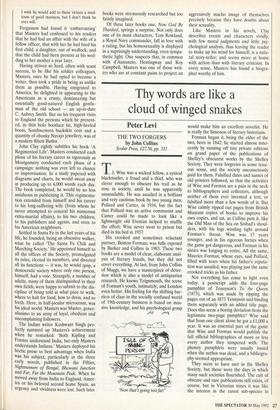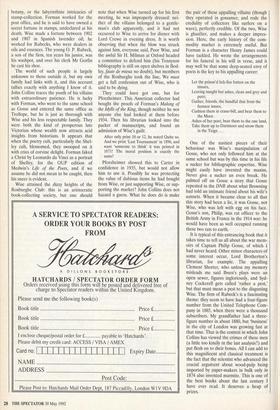Thy words are like a cloud of winged snakes
Peter Levi
THE TWO FORGERS by John Collins Scolar Press, £27.50, pp. 331 TJ. Wise was a wicked fellow, a cynical blackmailer, a fraud and a thief, who was clever enough to obscure his trail as he rose in society, until he was apparently unassailable. He was assailed in a brilliant and very cautious book by two young men, Pollard and Carter, in 1934, but the fact that Pollard was an active communist and Carter could be made to look like a lightweight old Etonian helped to muffle the effect; Wise never went to prison but died in his bed in 1937.
His crooked and sometimes reluctant partner, Buxton Forman, was fully exposed by Barker and Collins in 1983. These two books are a model of clear, elaborate anal- ysis of literary frauds, but they did not cover everything. At last, from John Collins of Maggs, we have a masterpiece of detec- tion which is also a model of antiquarian research. He knows Teignmouth, the scene of Forman's youth, intimately, and London even better. His feeling for the shifting bar- riers of class in the socially confused world of 19th-century business is based on mas- sive knowledge, and his psychological grasp
Wow that's going too far!'
would make him an excellent novelist. He is really the Simenon of literary historians.
Forman began it, being the elder of the two, born in 1842: he started almost inno- cently by running off tiny private editions on grand paper of the publications of Shelley's obscurest works by the Shelley Society. They were forgeries in some tenu- ous sense, and the society unconsciously paid for them. Falsified dates and names of old printers followed, so that the activities of Wise and Forman are a pain in the neck to bibliographers and collectors, although neither of them ever invented a text, or falsified more than a few words of it. But Wise calmly ripped out pages from British Museum copies of books to improve his own copies, and sat, as Collins puts it, like the Old Man of the Sea on Sinbad's shoul- ders, with his legs winding tight around Forman's throat. Wise was 17 years younger, and in his rigorous forties when the game got dangerous, and Forman in his sixties was longing to retire. All the same, Maurice Forman, whose eyes, said Pollard, filled with tears when his father's reputa- tion was assailed, was playing just the same crooked tricks as his father.
Not everything has come to light even today: a postscript adds the four-page pamphlet of Tennyson's To the Queen (1873), which was made by ripping the pages out of an 1873 Tennyson and binding them separately with an added title page. Does this seem a boring deviation from the legitimate two-page pamphlet? Wise said that from one client alone he got a £1,000 a year. It was an essential part of the game that Wise and Forman would publish the
full official bibliographies of more or less every author they tampered with. The phoney pamphlets were usually issued when the author was dead, and a bibliogra- phy seemed appropriate.
They seem to have met in the Shelley Society, but those were the days in which
many such societies flourished. The cult of obscure and rare publications still exists, of course, but in Victorian times it was like the interest in the rarest sub-species in
botany, or the labyrinthine intricacies of stamp-collection. Forman worked for the post office, and he is said to have owned a secret fortune in stamps, undeclared at his death. Wise made a fortune between 1902 and 1907 in Spanish lavender oil; he worked for Rubecks, who were dealers in oils and essences. The young 0. P. Rubeck, a son of the firm, ten years his junior, was his washpot, and over his clerk Mr Gorfin he cast his shoe.
The world of such people is largely unknown to those outside it, but my own family had links with it, and this account tallies exactly with anything I know of it. John Collins traces the youth of his villains with extraordinary patience. He is lucky with Forman, who went to the same school as Gosse and entered the same office as Trollope, but he is just as thorough with Wise and his less respectable family. They were both the kind of prosperous late Victorian whose wealth now attracts acid insights from historians. It appears that when the poetry cult, particularly the Shel- ley cult, blossomed, they swooped on it with cries of corvine delight. Forman faked a Christ by Leonardo da Vinci as a portrait of Shelley, for the OUP edition of Medwin's Life of the Poets, and if we assume he did not mean to be caught, then his sneer is evident.
Wise attained the dizzy heights of the Roxburghe Club: this is an aristocratic book-collecting society, but one should
note that when Wise turned up for his first meeting, he was improperly dressed: nei- ther of the villains belonged to a gentle- man's club apparently, and it had not occurred to Wise to arrive for dinner with Lord Crewe in evening dress. It is worth observing that when the blow was struck against him, everyone said, Poor Wise, and the awful Sir H. Milman at Oxford headed a committee to defend him (his Tennyson bibliography is still on open shelves in Bod- ley, faute de mieux no doubt), but members of the Roxburghe took the line, We must get a full confession out of Wise, who is said to be dying.
They could have got one, but for Pforzheimer. This American collector had bought the proofs of Forman's Making of the Idylls of the King, though neither he nor anyone else had looked at them before 1934. Then his librarian looked into the packet of manuscripts, and found an admission of Wise's guilt:
After only print 10 or 12, he noted Quite so. And we print 'Last Tournament' in 1896, and want 'someone to think' it was printed in 1871! The moral position is exactly the same!
Pforzheimer showed this to Carter in confidence in 1935, but would not allow him to use it. Possibly he was protecting the value of dubious items he had bought from Wise, or just supporting Wise, or sup- porting the market? John Collins does not hazard a guess. What he does do is make
the pair of these appalling villains (though they operated in gossamer, and rode the credulity of collectors like surfers on a wave), perfectly credible. Of the two, Wise is ghastlier, and makes a deeper impres- sion. Here, the early history of the com- modity market is extremely useful. But Forman is a character Henry James could have tackled. He wrote the arrangements for his funeral in his will in verse, and it may well be that some deep-seated envy of poets is the key to his appalling career:
Let the prison'd lich-fire batten on the tissues, Leaving naught but ashes, clean and grey and pure; Gather, friends, the handful that from the furnace issues, Cushion them in crane-bill, and bear them to the Moor.
Ashes of her poet, bear them to the one land, Take them up to Dartmoor and strow them in the Teign
One of the nastiest pieces of their behaviour was Wise's manipulation of Gosse, who not only followed him at the same school but was by this time in his life a sucker for bibliographic expertise. Wise might easily have invented the maxim, Never give a sucker an even break. He palmed off on Gosse a story that Gosse repeated in the DNB about what Browning had told an intimate friend about his wife's sonnets. When it became clear to all that this story had been a lie, it was Gosse, not Wise, who was left with egg on his face. Gosse's son, Philip, was rat officer to the British Army in France in the 1914 war: he would have been as well occupied running these two rats to earth.
It is typical of this entrancing book that it takes time to tell us all about the war mem- oirs of Captain Philip Gosse, of which I had never heard. Other minor characters of some interest occur, Lord Brotherton's librarian, for example. The appalling Clement Shorter, who unless my memory misleads me said Ibsen's plays were an open sewer, figures ingloriously, and Syd- ney Cockerell gets called 'rather a pest,' but that must mean a pest to the disgusting Wise. The firm of Rubeck's is a fascinating theme: they seem to have had a four-figure number from the United Telephone Com- pany in 1885, when there were a thousand subscribers. My grandfather had a three- figure number in about 1880, but 'business' in the city of London was growing fast at that time. That is the context in which John Collins has viewed the crimes of these men (a little too kindly in the last analysis?) and put flesh on to their bones. All I can add to this magnificent and classical treatment is the fact that the scientist who advanced the crucial argument about wood-pulp being imported by paper-makers in bulk only in 1874 also invented marmite. This is one of the best books about the last century I have ever read. It deserves a heap of prizes.

















































 Previous page
Previous page